Signs of the Times • 29 September 2016 • No. 90
Introduction: Special issue on fear
Not every fearful moment is holy, but holy moments are almost always scary.
Think of Hagar’s deathwatch in the desert, the Hebrew people at the Red Sea, Elijah when surrounded by Aram’s army, the psalmist’s pilgrim in the valley of the shadow of death, the angels’ first words—fear not!—to 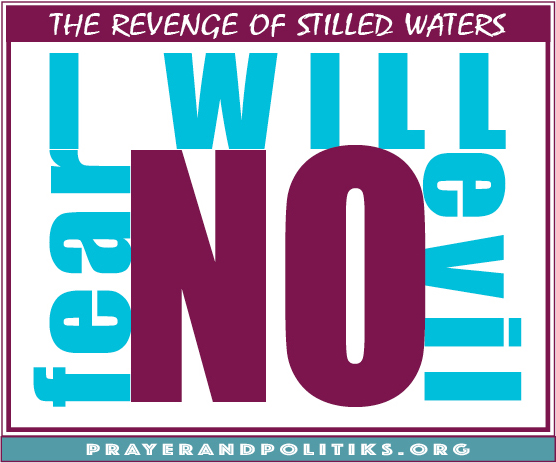 Zachariah, Joseph, Mary, and the shepherds; then later Jesus’ resurrection greetings to the disciples.
Zachariah, Joseph, Mary, and the shepherds; then later Jesus’ resurrection greetings to the disciples.
Fear arises because such epiphanies call us out of comfort zones, into threatening circumstances and risks whose outcomes are indeterminate. Heaven’s hail always entails abandoning security guarantees and fixed arrangements. Manna’s fall, and water’s flow from desert rocks, are beyond our management. Strategic goals and objectives planning will be interrupted.
Some things will fall away, and maybe apart, when human hearts rhyme with Heaven’s intent.
Fear makes fools of us all. Enmity is infectious. Hatred bounces and inflicts collateral damage. Hope is to be had, but not for private consumption. We will get there—together or not at all, which is why Jesus’ bidding binds us to enemies.
Holy callings are more common than you think. As Barbara Brown Taylor writes, “Earth is so thick with divine possibility that it is a wonder we can walk anywhere without cracking our shins on altars.”
This special issue is dedicated to all my fellow patients undergoing fear displacement therapy. —Ken Sehested
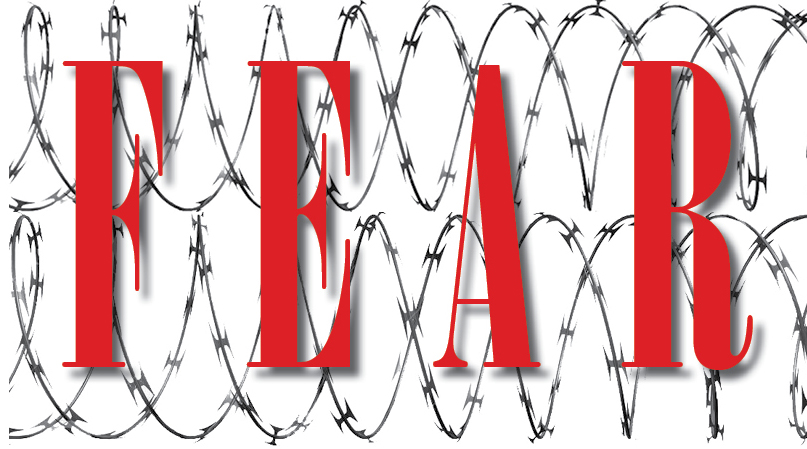
Processional. “Lo Yira” (“Will Not Fear”), Yuval Ron Ensemble.
§ There is no fear in love, but perfect love casts out fear; for fear has to do with punishment, and whoever fears has not reached perfection in love. ~1 John 4:18
§ The world is God's and it will not fall apart. The new age which the Lord has begun cannot be driven out or held back. The church need not live out of fear as though the gospel were not true. It is destined to live toward freedom, toward the pain of the world, toward the hurt of the world, toward the joy of the world—the hurt and pain the world does not understand and the joy the world does not anticipate. ~Walter Brueggemann
§ When we are able to keep company with our own fears and sorrows, we are shown the way to go, our parched lives are watered, and the earth becomes a greener place. ~Elizabeth O’Connor
§ Fear is the polio of the soul, which prevents our walking by faith. ~Clarence Jordan
§ When the escaping Hebrews were caught between the Red Sea ahead and Pharaoh’s army behind, Moses said  to the people, "Do not be afraid, stand firm, and see the deliverance that the Lord will accomplish for you today; for the Egyptians whom you see today you shall never see again. ~Exodus 20:20
to the people, "Do not be afraid, stand firm, and see the deliverance that the Lord will accomplish for you today; for the Egyptians whom you see today you shall never see again. ~Exodus 20:20
§ Don’t be afraid of your fears. They’re not there to scare you. They’re there to let you know that something is worth it. ~C. JoyBell C.
§ It is part of the general pattern of misguided policy that our country is now geared to an arms industry which was bred in an artificially psychosis of war hysteria and nurtured upon an incessant propaganda of fear. ~General Douglas MacArthur
§ Faith is not the absence of fear or doubt, but the force that gets you safely through those long, dark, waiting-room hours. ~Merrill Womach
§ Courage is fear that has said its prayers. ~Joseph Gallagher
§ Surely God is my salvation; I will trust, and will not be afraid, for the Lord God is my strength and my might; God has become my salvation. ~Isaiah 12:2
§ It is not power that corrupts but fear. Fear of losing power corrupts those who wield it, and fear of the scourge of power corrupts those who are subject to it. ~Aung San Suu Kyi
§ One of the things we must cast out first of all is fear. Fear narrows the little entrance of our heart. It shrinks up our capacity to love. It freezes up our power to give ourselves. ~Thomas Merton
§ Fear is not the opposite of courage. Fear is the catalyst of courage. ~Joan D. Chittister
§ And you, O mortal, do not be afraid of them, and do not be afraid of their words, though briers and thorns surround you and you live among scorpions. ~Ezekiel 2:6
§ I no longer love blue skies. In fact, I now prefer gray skies. The drones do not fly when the skies are gray, and 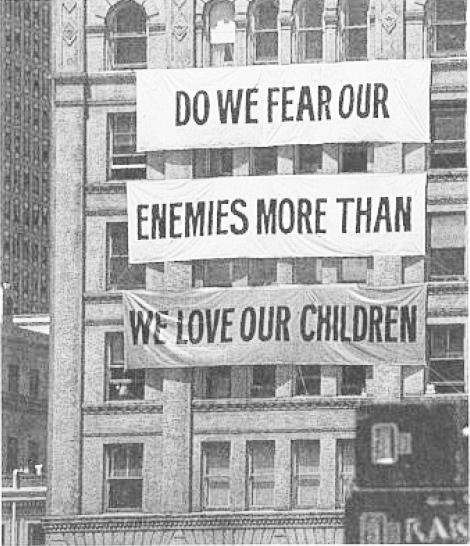 so for a short period of time the mental tension and the fear lessens. But when the sky brightens, the drones return, and so does the fear.” ~Zubair Rehman, 13-year-old Pakistani whose mother was killed by a US drone attack, speaking through an interpreter at a 2013 Congressional hearing
so for a short period of time the mental tension and the fear lessens. But when the sky brightens, the drones return, and so does the fear.” ~Zubair Rehman, 13-year-old Pakistani whose mother was killed by a US drone attack, speaking through an interpreter at a 2013 Congressional hearing
§ PHOBIAS. Glossophobia: Fear of speaking in public or of trying to speak. Agoraphobia: Fear of leaving a safe place, the outdoors, or of being in crowded, public places. Sesquipedalophobia: Fear of long words. Coulrophobia: Fear of clowns. Kenophobia: Fear of voids, or wide-open empty spaces. Arachibutyrophobia: Fear of peanut butter stuck to the roof of one’s mouth. Claustrophobia: Fear of confined spaces. Herpetophobia: Fear of reptiles or creepy-crawly things. Arachnophobia: Fear of spiders. Lygophobia: Fear of darkness.
§ When we speak we are afraid / our words will not be heard / nor welcomed / but when we are silent / we are still afraid / So it is better to speak / remembering / we were never meant to survive. ~Audre Lorde
§ When the King of Aram’s army surrounded the house of the Prophet Elisha, Elisha calmed his frightened servant saying, "Do not be afraid, for there are more with us than there are with them." ~1 Kings 17:13
§ When our moral lives are shaped by fear, and safety is worshiped as the highest good . . . we are more likely 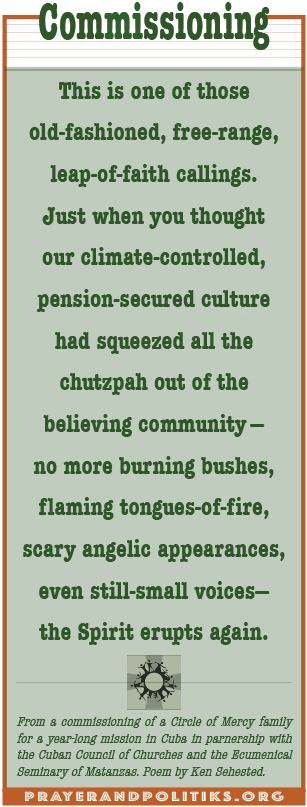 to tell our children to “be careful” than to “be good.” Our moral lives atrophy on this new diet of self-protection. ~Scott Bader-Saye
to tell our children to “be careful” than to “be good.” Our moral lives atrophy on this new diet of self-protection. ~Scott Bader-Saye
§ He will never have true friends who is afraid of making enemies. ~William Hazlitt
§ Never doubt that a small group of thoughtful committed citizens can change the world: indeed it’s the only thing that ever has. ~Margaret Mead
§ Inspiration and craft plus time and effort minus fear and doubt multiplied by purpose equals song. ~Ray Wylie Hubbard, country/folk/blues singer-songwriter
§ Don't be afraid of being scared. To be afraid is a sign of common sense. Only complete idiots are not afraid of anything. ~Carlos Ruiz Zafón
§ They shall no more be plunder for the nations, nor shall the animals of the land devour them; they shall live in safety, and no one shall make them afraid. . . . They shall all sit under their own vines and under their own fig trees, and no one shall make them afraid. . . . They will pasture and lie down, and no one shall make them afraid. ~Ezekiel 34:28; Micah 4:4; Zephaniah 3:13
§ “The thing with fear is, it's like anger. You've got to change it into something else. Make it your weapon. Some can just turn it into smarts. The best of ’em can turn fear and anger into love.” She looked out toward our neighborhood. “I'm not there yet.” ~Margaret McMullan, Sources of Light
§ A bird sitting on a branch is never afraid of it breaking, because her trust isn’t in the branch but in her own wings. ~author unknown
§ Fear is a hazard of great endeavors to bridge political differences. In 1963, racial apprehension before [the March on Washington] drove the federal government to furlough its workers for the day. The Pentagon deployed 20,000 paratroopers. Hospitals stockpiled plasma. Washington banned sales of alcohol, and Major League Baseball canceled not just one but two days of [Washington’s games], just to be sure. When the march of benign inspiration embarrassed these measures, opponents still insisted that the civil rights bill would enslave white people. ~Taylor Branch
§ There were no formerly heroic times, and there was no formerly pure generation. There is no one here but us chickens, and so it has always been. ~Annie Dillard
§ The Lord is my light and my salvation; whom shall I fear? The Lord is the stronghold of my life; of whom shall  I be afraid? ~Psalm 27:1
I be afraid? ~Psalm 27:1
§ Courage is not the absence of fear, but rather the judgment that something else is more important than fear. ~James Hollingsworth
§ Die now! die now! / In this Love, die; / when you have died in this Love, / you will all receive new life. ~Rumi
§ “NO!” (Don’t be afraid to say it.) ~author unknown
§ We have to fight them daily, like fleas, those many small worries about the morrow, for they sap our energies. ~Etty Hillesum
§ Has it ever struck you that those who most fear to die are the ones who most fear to live? ~Anthony de Mello
§ In God I trust; I am not afraid. What can a mere mortal do to me? ~Psalm 56:11
§ I don’t gather that God wants us to pretend our fear doesn’t exist, to deny it, or eviscerate it. Fear is a reminder that we are creatures. But fear shouldn’t dominate or control or define us. Rather, it should submit to faith and love. ~Philip Berrigan
§ Forgiveness liberates the soul. It removes fear. That is why it is such a powerful weapon. ~Nelson Mandela
§ Courage has never been about being fearless, it has always been about loving something or someone so much that you'll brave the scary parts. ~Carrie Newcomer
§ I’m not fearing any man! ~Martin Luther King Jr. (Watch this 1:16 video clip from his final speech)
§ Do not fear, for I am with you, do not be afraid, for I am your God; I will strengthen you, I will help you, I will uphold you with my victorious right hand. ~Isaiah 41:10
§ We have places of fear inside of us, but we have other places as well~places with names like trust and hope  and faith. We can choose to lead from one of those places. . . . As we stand in one of those places, fear may remain close at hand and our spirits may still tremble. But now we stand on ground that will support us. ~Parker Palmer
and faith. We can choose to lead from one of those places. . . . As we stand in one of those places, fear may remain close at hand and our spirits may still tremble. But now we stand on ground that will support us. ~Parker Palmer
§ I have learned over the years that when one's mind is made up, this diminishes fear; knowing what must be done does away with fear. ~Rosa Parks
§ If you are caught on a golf course during a storm and are afraid of lightning, hold up a 1-iron. Not even God can hit a 1-iron. ~Lee Trevino
§ It is impossible to be unarmed when my blackness is the weapon you fear. ~Rev. Traci Blackmon
§ Blessed are those who are persecuted for righteousness sake. ~Matthew 5:10
§ I freed a thousand slaves. I could have freed a thousand more if only they knew they were slaves. ~Harriet Tubman
§ Fear tells me that while there might be a host of people who wish to stand beside me in times of crisis, the tangled wreckage is sometimes so enormous that the best of their efforts leave them stranded at a great  distance. And standing desperately alone surveying the carnage that holds all others a bay, God suddenly taps me on the shoulder, leans over and whispers, “how about a little demolition?” ~Craig D. Lounsbrough
distance. And standing desperately alone surveying the carnage that holds all others a bay, God suddenly taps me on the shoulder, leans over and whispers, “how about a little demolition?” ~Craig D. Lounsbrough
§ Though voters may speak piously and rather vaguely about Christian values and ideals, polls and election results communicate clearly that this is a nation consumed by fear, anger and suspicion, none of which are Christian virtues. ~Norman Werzba
§ Stand before the people you fear and speak your mind—even if your voice shakes. ~Maggie Kuhn
§ Do not be afraid, but let your hands be strong. ~Zechariah 8:13
§ Fear displacement is the most important pastoral duty we have in our communities, to heal the dis-ease of anxious hearts and timid decorum, thereby unleashing confident defiance of the politics of panic. Jesus beckons us to the Table for just this purpose. ~Ken Sehested
§ The phrase “do not be afraid” is written in the Bible 365 times. That’s a daily reminder from God to live every day being fearless. ~author unknown
§ “Fear of God” is not cowering, frightened intimidation. Those who fear God are not wimps and are not preoccupied with excessive need to please God. They are rather those who have arrived at a fundamental vision  of reality about life with God, who have enormous power, freedom, and energy to live out that vision. “Fear of God” is liberating and not restrictive, because it gives confidence about the true shape of the world. ~Walter Brueggemann
of reality about life with God, who have enormous power, freedom, and energy to live out that vision. “Fear of God” is liberating and not restrictive, because it gives confidence about the true shape of the world. ~Walter Brueggemann
§ The moment we begin to fear the opinions of others and hesitate to tell the truth that is in us, and from motives of policy are silent when we should speak, the divine floods of light and life no longer flow into our souls. ~Elizabeth Cady Stanton
§ Jesus promised his disciples three things—that they would be completely fearless, absurdly happy, and in constant trouble. ~G.K. Chesterton
§ Fearless citizens are a king’s greatest nightmare. ~author unknown
§ I, I am the One who comforts you; why then are you afraid of a mere mortal who must die, a human being who fades like grass? ~Isaiah 51:12
§ Thou, greatest solace in all suffering, / Help us to fear neither shame nor death, / that we do not despair / before the enemy sues for our life. / Kyrioleis. ~Martin Luther’s Pentecost hymn lyrics
§ Grab the broom of anger and drive off the beast of fear. ~Zora Neale
§ Do not fear those who kill the body but cannot kill the soul; rather fear him who can destroy both soul and 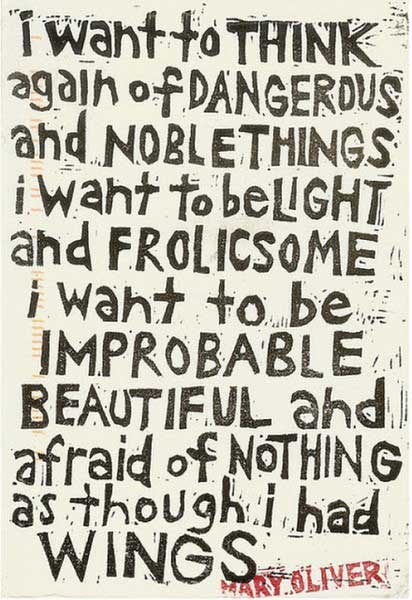 body in hell. ~Matthew 10:28
body in hell. ~Matthew 10:28
§ To him who is in fear everything rustles. ~Sophocles
§ I say I am stronger than fear. ~Malala Yousafzai
§ Even death is not to be feared by one who has lived wisely. ~Buddha
§ I tremble for my country when I reflect that God is just; that his justice cannot sleep forever. ~Thomas Jefferson
§ Thus he has shown the mercy promised to our ancestors, and has remembered his holy covenant . . . that we, being rescued from the hands of our enemies, might serve him without fear. ~Luke 1:72-73
§ What is needed, rather than running away or controlling or suppressing or any other resistance, is understanding fear; that means, watch it, learn about it, come directly into contact with it. We are to learn about fear, not how to escape from it. ~Jiddu Krishnamurti
§ Love is what we were born with. Fear is what we learned here. ~Marianne Williamson
§ No good work is ever done while the heart is hot and anxious and fretted. ~Olive Schreiner
§ Courage is a peculiar kind of fear. ~Charles Kennedy
§ Peace I leave with you; my peace I give to you. I do not give to you as the world gives. Do not let your hearts be troubled, and do not let them be afraid. ~John 14:27
§ Grief has limits, whereas apprehension has none. For we grieve only for what we know has happened, but we 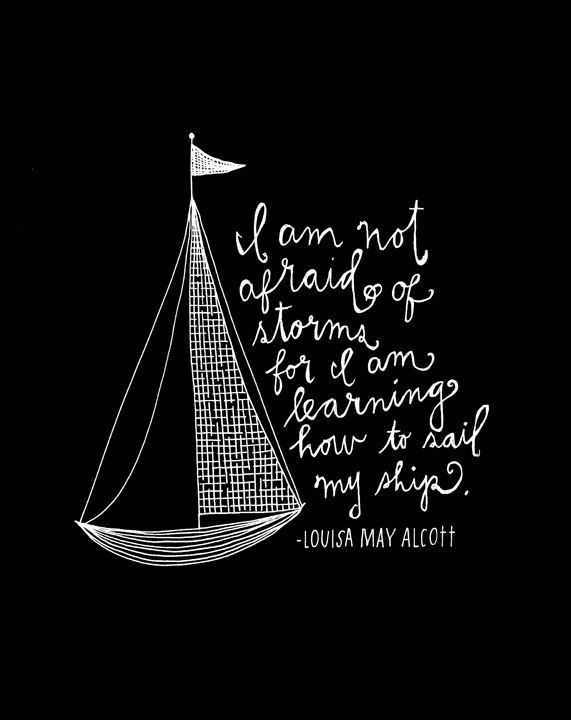 fear all that possibly may happen. ~Pliny the Elder
fear all that possibly may happen. ~Pliny the Elder
§ There is no passion so contagious as that of fear. ~Michel de Montaigne
§ Only when we are no longer afraid do we begin to live. ~Dorothy Thompson
§ Nothing gives a fearful man more courage than another's fear. ~Umberto Eco
§ In the world you face persecution. But take courage [be of good cheer]; I have conquered the world! ~John 16:33
§ Hate is the consequence of fear; we fear something before we hate it. ~Cyril Connolly
§ As a child, I was more afraid of tetanus shots than, for example, Dracula. ~Dave Barry
§ Fear is static that prevents me from hearing myself. ~Samuel Butler
§ Fear is excitement without breath. ~Robert Heller
§ For you did not receive a spirit of slavery to fall back into fear, but you have received a spirit of adoption. When we cry, "Abba! Father!" ~Romans 8:15
§ A child understands fear, and the hurt and hate it brings. ~Nadine Gordimer
§ There is no hope unmingled with fear, and no fear unmingled with hope. ~Baruch Spinoza
§ The fear of death follows from the fear of life. A man who lives fully is prepared to die at any time. ~Mark Twain
§ So we can say with confidence, "The Lord is my helper; I will not be afraid. What can anyone do to me?" 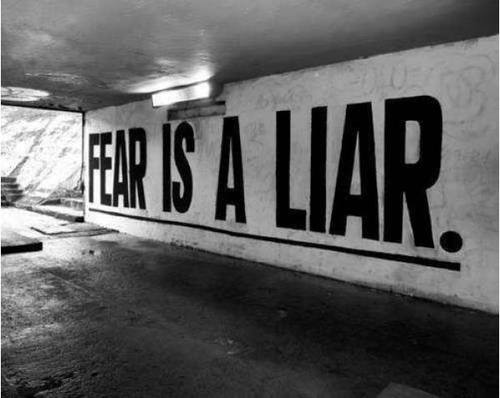 ~Hebrews 13:6
~Hebrews 13:6
§ You gain strength, courage, and confidence by every experience in which you really stop to look fear in the face. You are able to say to yourself, “I lived through this horror. I can take the next thing that comes along.” ~Eleanor Roosevelt
§ To be afraid is to behave as if the truth were not true. ~Bayard Rustin
§ Power is of two kinds. One is obtained by the fear of punishment and the other by acts of love. Power based on love is a thousand times more effective and permanent then the one derived from fear of punishment. ~Mahatma Gandhi
§ I am not afraid of storms for I am learning to sail my ship. ~Louisa May Alcott
§ Those who “fear the Lord,” who “abide in [God’s] tent,” who “dwell on [God’s] holy hill, are marked as those “who walk blamelessly,” “speak truth,” “do not slander,” “nor take up reproach against their neighbors,” “stand by their oath,” “do not lend money at interest,” “do not take a bribe against the innocent.” ~Psalm 15
§ Courage is knowing what not to fear. ~Plato
§ A friend may be waiting behind a stranger's face. ~Maya Angelou
§ Love will find a way through paths where wolves fear to prey. ~Lord Byron
§ She is clothed with strength and dignity, and she laughs without fear of the future. ~Proverbs 31:25
§ Love takes off masks that we fear we cannot live without and know we cannot live within. ~James A. Baldwin
§ There is a time to take counsel of your fears, and there is a time to never listen to any fear. ~George S. Patton
§ Courage consists not in hazarding without fear; but being resolutely minded in a just cause. ~Plutarch
§ God called to Hagar in the wilderness after Sarah expelled her and Ishmael from the house: "What troubles you, Hagar? Do not be afraid; for God has heard the voice of the boy where he is.” ~Genesis 21:17
§ Courage is resistance to fear, mastery of fear, not absence of fear. ~Mark Twain
§ Fear is the highest fence. ~Dudley Nichols
§ I feel sorry for anybody that could let hate wrap them up. Ain't no such thing as I can hate anybody and hope to see God's face. ~Fannie Lou Hamer
 § Be truthful, gentle, and fearless. ~Mahatma Gandhi
§ Be truthful, gentle, and fearless. ~Mahatma Gandhi
§ On his right hand Billy’d tattooed the word love and on his left hand was the word fear / And in which hand he held his fate was never clear. ~Bruce Springsteen, “Cautious Man”
§ Note the behaviors associated with “fearing God”
• You shall not cheat one another, but you shall fear your God. ~Leviticus 25:17
• Do not take interest in advance or otherwise make a profit from them, but fear your God. ~Leviticus 25:36
• You shall not rule over them with harshness, but shall fear your God. ~Leviticus 25:43
• Now, let the fear of the Lord be upon you; take care what you do, for there is no perversion of justice with the Lord our God, or partiality, or taking of bribes." ~Chronicles 19:7
• The former governors who were before me laid heavy burdens on the people. . . . But I did not do so, because of the fear of God. ~Nehemiah 5:15
• Those who withhold kindness from a friend forsake the fear of the Almighty. ~Job 6:14
 § We must not fear daylight just because it almost always illuminates a miserable world. ~Rene Magritte
§ We must not fear daylight just because it almost always illuminates a miserable world. ~Rene Magritte
§ Be fearless in what sets your soul on fire. ~author unknown
§ Love casts out fear, but we have to get over the fear in order to get close enough to love. ~Dorothy Day
§ The process of spotting fear and refusing to obey it is the source of all true empowerment. ~Martha Beck
§ I done wrestled with an alligator, I done tussled with a whale; handcuffed lightning, throwed thunder in jail. ~Muhammad Ali
§ In John the Revelator’s fantastic, frightening vision he saw the Promised One, who said “Do not be afraid; I am the first and the last, and the living one. I was dead, and see, I am alive forever and ever; and I have the keys of Death and of Hades. ~Revelation 1:17-18
Recessional. “Going home, going home / I'm jus' going home / Quiet like, some still day / I'm jus' going home / It's not far, yes close by / Through an open door / Work all done, care laid by / Going to fear no more.” ~“Going Home," music by Antonin Dvorak, performed by Libera
# # #
Featured this week on prayer&politiks
• "Days of hysteria, promise of hilaria: Response to a presidential debate"
Leave your comments (or post your favorite quote) on this issue in the "reader comments" section below. Or send them directly to me at kensehested @ prayerandpolitiks.org.
©ken sehested @ prayerandpolitiks.org


 Zachariah, Joseph, Mary, and the shepherds; then later Jesus’ resurrection greetings to the disciples.
Zachariah, Joseph, Mary, and the shepherds; then later Jesus’ resurrection greetings to the disciples.
 to the people, "Do not be afraid, stand firm, and see the deliverance that the Lord will accomplish for you today; for the Egyptians whom you see today you shall never see again. ~Exodus 20:20
to the people, "Do not be afraid, stand firm, and see the deliverance that the Lord will accomplish for you today; for the Egyptians whom you see today you shall never see again. ~Exodus 20:20 so for a short period of time the mental tension and the fear lessens. But when the sky brightens, the drones return, and so does the fear.” ~Zubair Rehman, 13-year-old Pakistani whose mother was killed by a US drone attack, speaking through an interpreter at a 2013 Congressional hearing
so for a short period of time the mental tension and the fear lessens. But when the sky brightens, the drones return, and so does the fear.” ~Zubair Rehman, 13-year-old Pakistani whose mother was killed by a US drone attack, speaking through an interpreter at a 2013 Congressional hearing to tell our children to “be careful” than to “be good.” Our moral lives atrophy on this new diet of self-protection. ~Scott Bader-Saye
to tell our children to “be careful” than to “be good.” Our moral lives atrophy on this new diet of self-protection. ~Scott Bader-Saye I be afraid? ~Psalm 27:1
I be afraid? ~Psalm 27:1 and faith. We can choose to lead from one of those places. . . . As we stand in one of those places, fear may remain close at hand and our spirits may still tremble. But now we stand on ground that will support us. ~Parker Palmer
and faith. We can choose to lead from one of those places. . . . As we stand in one of those places, fear may remain close at hand and our spirits may still tremble. But now we stand on ground that will support us. ~Parker Palmer distance. And standing desperately alone surveying the carnage that holds all others a bay, God suddenly taps me on the shoulder, leans over and whispers, “how about a little demolition?” ~Craig D. Lounsbrough
distance. And standing desperately alone surveying the carnage that holds all others a bay, God suddenly taps me on the shoulder, leans over and whispers, “how about a little demolition?” ~Craig D. Lounsbrough of reality about life with God, who have enormous power, freedom, and energy to live out that vision. “Fear of God” is liberating and not restrictive, because it gives confidence about the true shape of the world. ~Walter Brueggemann
of reality about life with God, who have enormous power, freedom, and energy to live out that vision. “Fear of God” is liberating and not restrictive, because it gives confidence about the true shape of the world. ~Walter Brueggemann body in hell. ~Matthew 10:28
body in hell. ~Matthew 10:28 fear all that possibly may happen. ~Pliny the Elder
fear all that possibly may happen. ~Pliny the Elder ~Hebrews 13:6
~Hebrews 13:6
 § Be truthful, gentle, and fearless. ~Mahatma Gandhi
§ Be truthful, gentle, and fearless. ~Mahatma Gandhi § We must not fear daylight just because it almost always illuminates a miserable world. ~Rene Magritte
§ We must not fear daylight just because it almost always illuminates a miserable world. ~Rene Magritte

 Right: Water defenders shut down construction of the Dakota Access pipeline by obstructing the equipment on 6 September 2016. Photos by Rob Wilson.
Right: Water defenders shut down construction of the Dakota Access pipeline by obstructing the equipment on 6 September 2016. Photos by Rob Wilson. Corps land bordering or under Lake Oahe will not go forward at this time.” —9 September 2016
Corps land bordering or under Lake Oahe will not go forward at this time.” —9 September 2016  Engineers—the same Army Corps now approving the pipeline—built five large dams along the Missouri, forcing Indian villages to relocate. More than two hundred thousand acres disappeared beneath the water.” —Bill McKibben, “
Engineers—the same Army Corps now approving the pipeline—built five large dams along the Missouri, forcing Indian villages to relocate. More than two hundred thousand acres disappeared beneath the water.” —Bill McKibben, “ Cancer.” When Thomas Moore saw his mom watching a video on Facebook about a girl who had lost her hair to cancer, he had an idea. He decided to start growing his hair out for kids who had lost theirs to chemotherapy, and so that's what he did. For the next two years. —J
Cancer.” When Thomas Moore saw his mom watching a video on Facebook about a girl who had lost her hair to cancer, he had an idea. He decided to start growing his hair out for kids who had lost theirs to chemotherapy, and so that's what he did. For the next two years. —J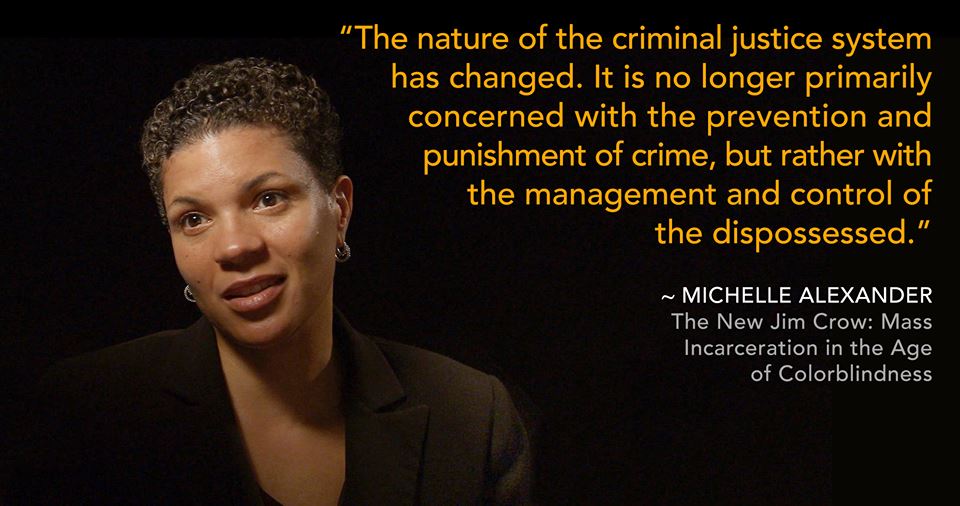 ¶ Confession. “
¶ Confession. “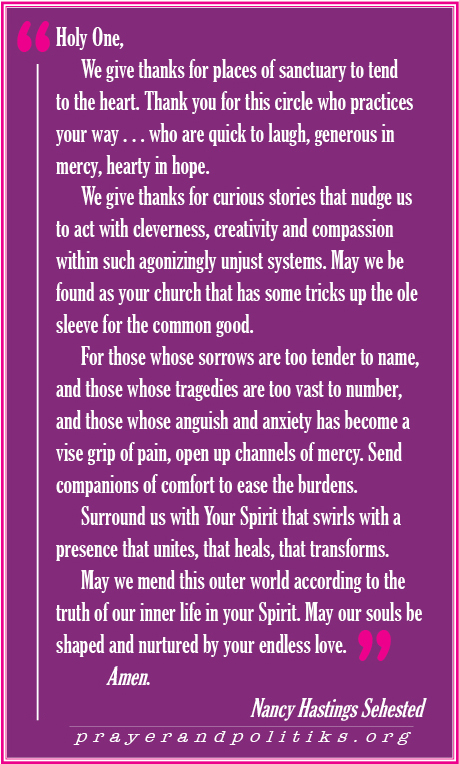 But in order to see the world rightly we dare not close our eyes to the surrounding, actual bloodbath that marks our day, whether near or far away. If there is any hope of healing, people of faith and conscience must—must—be willing to risk the traumatizing effect of visual exposure to actual bloody history. Damien Cave and Rochelle Oliver have gathered “
But in order to see the world rightly we dare not close our eyes to the surrounding, actual bloodbath that marks our day, whether near or far away. If there is any hope of healing, people of faith and conscience must—must—be willing to risk the traumatizing effect of visual exposure to actual bloody history. Damien Cave and Rochelle Oliver have gathered “ ¶ For the beauty of the earth. “
¶ For the beauty of the earth. “ year. Meaning: if we don’t spend the allotted amount, we carry that surplus over to the next year. We don’t do that with any other line item. We maintain this commitment because when finances get tight, most congregations end up cutting the missions budget. This commitment involves a spiritual discipline as well as a budgetary practice: Relinquishing control over some portion of our assets reflects our convictions about God’s alternative economy. It is a counter-cultural habit that testifies against the rule of hoarding.
year. Meaning: if we don’t spend the allotted amount, we carry that surplus over to the next year. We don’t do that with any other line item. We maintain this commitment because when finances get tight, most congregations end up cutting the missions budget. This commitment involves a spiritual discipline as well as a budgetary practice: Relinquishing control over some portion of our assets reflects our convictions about God’s alternative economy. It is a counter-cultural habit that testifies against the rule of hoarding.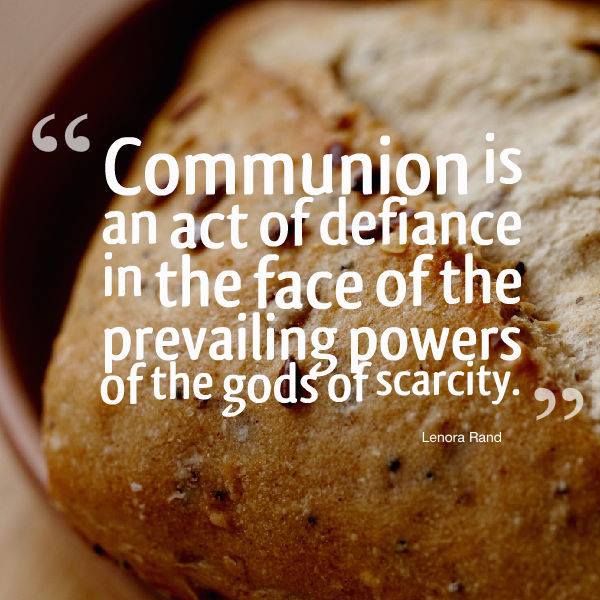 training series each year—and each year, Jo Hauser has organized an evening meal for the group. I think Tracey Whitehead has raised money for about half the nonprofit organizations in town. Greg Yost has labored and lobbied and stood in courtroom defendants’ chairs several times—and jail cells as well—as an advocate of the earth’s health and well-being.
training series each year—and each year, Jo Hauser has organized an evening meal for the group. I think Tracey Whitehead has raised money for about half the nonprofit organizations in town. Greg Yost has labored and lobbied and stood in courtroom defendants’ chairs several times—and jail cells as well—as an advocate of the earth’s health and well-being. out of the rat race, to come to experience the sheer relief of knowing the world’s healing is not finally up to us. Being exhausted in the world of nonprofit work can be as deafening as exhaustion in the for-profit world.
out of the rat race, to come to experience the sheer relief of knowing the world’s healing is not finally up to us. Being exhausted in the world of nonprofit work can be as deafening as exhaustion in the for-profit world.